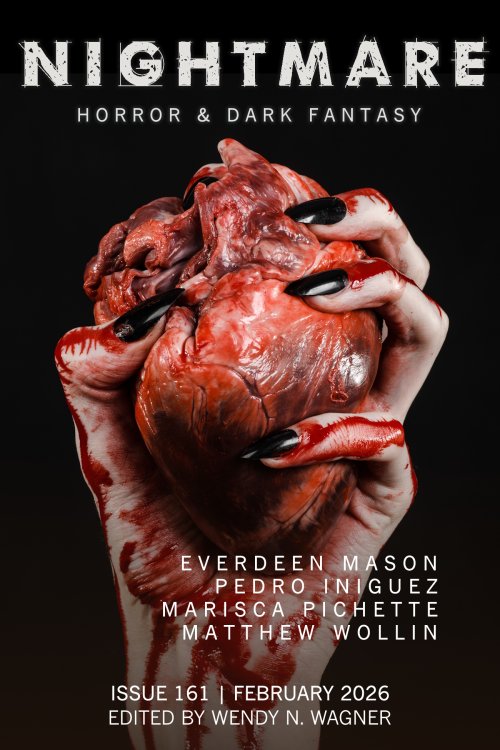“MAMMOTH” is a nuanced story which never tips over into one of the traps of our (interlinked internet) age, namely that of brutal and ugly partisanship simply for clicks. Quite the opposite. The story focused more on unraveling the (sometimes symbolic) nature of what’s operating behind us. This must have been challenging to maintain. Could you give us some insights into your thoughts or process when writing this story?
Thank you so much! Yes, I think that’s right—this story is attempting to unravel, in a symbolic way, the material reality of what’s operating behind us.
It’s interesting: I’ve never written a story in the instinctive, almost subconscious way that I wrote this one. I’ve written scenes that way, sure, but never an entire story. It tumbled out of me; a pure distillation of anxiety and dread. But it had been bubbling for years.
“MAMMOTH” started life at the Clarion Writers’ Workshop ten years ago. It was a very different story back then, much more conventional in its structure. The elevator pitch for it was “elder god extremists,” and it was essentially a single extended scene of a character (Gorgo Mormo!) being interrogated on a plane by a pair of CIA agents after a series of school shootings and bombings, accompanied by the appearance of a strange video of three hooded figures. A cool scene, no doubt, but it was pretty much a genre pastiche of interrogation scenes from the movies Zero Dark Thirty and The Dark Knight Rises. Not the most interesting, as our instructor Geoff Ryman pointed out, and, frankly, politically incoherent.
I couldn’t figure out what to do with it, and when I read Caitlin Kiernan’s Agents of Dreamland and Charles Stross’ A Colder War—both of which did the whole “government spooks plus elder gods” thing in a much more interesting way—I finally decided to shelve it.
But the world had changed. The Internet, it turned out, was not a beneficial, unifying force. Fascism was on the rise, vast populations of young men were being radicalized off YouTube videos, misinformation was spreading on an industrial scale, and the tech companies were laughing all the way to the bank. And so, in January 2021, I sat down and wrote the words “If you haven’t seen it yet, you will”—and the first half of the story just tumbled right onto the page.
I tried to finish it in the following weeks, but couldn’t. The story made me so anxious that I took three years to return to it, and in the intervening time, large language models had become the rotten apple of Silicon Valley’s eye, the tale’s missing piece finally falling into place. And so here we are!
I also enjoyed the tech-cosmic horror angle. This is terrifying in the sense that we made it . . . but did we really? Are we just substituting gods for gods for gods endlessly, so much so that we lose any sense of agency, easily tricked? How would you say the elements of cosmic horror influenced your thinking when writing the story?
I’m so glad you enjoyed that! Cosmic horror is one of my favorite sub-genres. Writers like Laird Barron, Thomas Ligotti, Caitlin R. Kiernan, and of course, my racist literary uncle H.P. Lovecraft have been hugely influential on me.
Cosmic horror’s core conceit is that the forces which rule the universe are callously indifferent, if not actively hostile towards human life and well-being. Similarly, the force that currently rules human civilization—capitalism’s ravenous hunger for profits and growth—is callously indifferent not just towards human well-being, but towards the very planetary conditions that enabled our evolution as a species.
So when I think about, say, people being radicalized on YouTube through algorithms designed to force-feed them content for the sake of ad revenue; or about the ever-increasing environmental burden of technologies like large language models (which are trained with massive amounts of unpaid or hyper-exploited human labor); or about the mammoth (heh) profits that fossil fuel companies are making as we careen towards planetary conditions not seen in hundreds of thousands, perhaps even millions of years . . . I think about cosmic horror. The blind destruction of our ecological niche by an unthinking god of our own making.
Cosmic horror, a genre about revealing the universe’s darkest truths, can be an excellent way to come to grips with the vertiginous horror of watching vast, human-made systems destroy the infinitely more complex planetary systems that sustain life as we know it.
The tech industry has its own gods and god complexes. But I don’t think going to Mars will save us. Nor will building some godlike artificial intelligence. No—if there is to be a worthwhile, dignified future for human life on Earth, we have to break free of this malevolent cosmology, this planet-devouring maw before it swallows us all whole.








